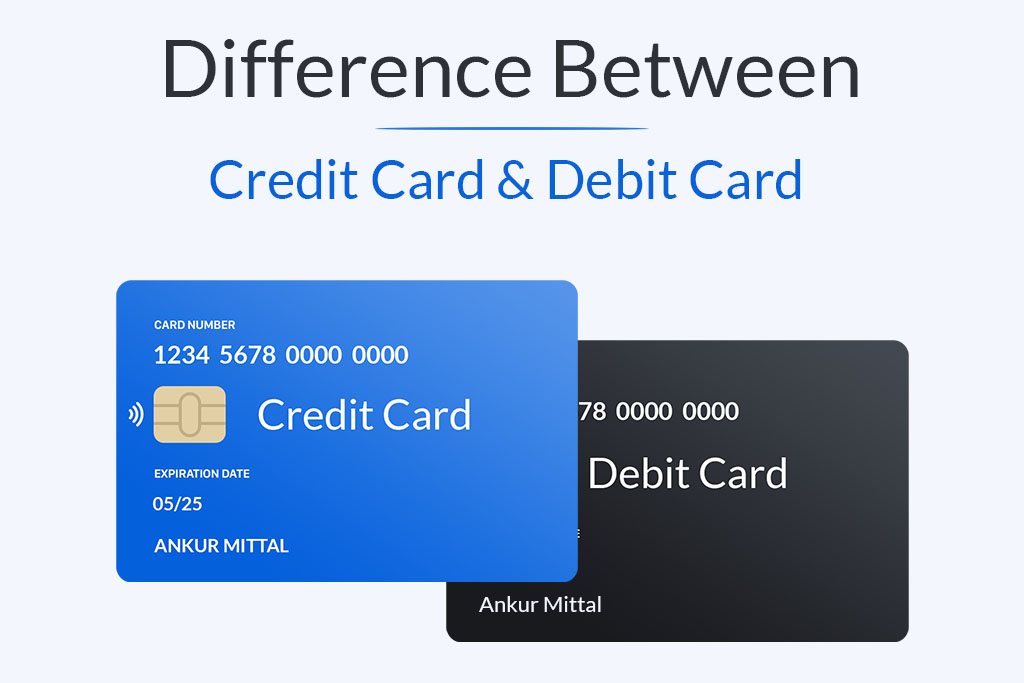Credit cards and debit cards are plastic payment cards that allow users to access money to make purchases hassle-free. These payment cards look practically similar in their build and design but differ in the way they function. A debit card is linked directly to the cardholder’s bank account. When the cardholder uses a debit card to complete a transaction, the amount gets debited from his/her bank account. A credit card is not the same as a debit card. It provides an instant credit facility to its users. A credit card is linked directly with a credit issuer company, i.e., a bank or financial institution that purchases on the cardholder’s behalf. The funds borrowed by the cardholder create a line of credit, payable in the form of monthly installments to the card issuer.

What is a Credit Card?
A credit card is a payment card issued by card issuer companies such as banks and financial institutions. They provide a loan to their customers that enable them to make purchases against a credit limit. The bank offers credit for a set length of time for the cardholder to make a purchase. The borrowed amount is repayable to the bank within a set time frame known as the due date. The bank establishes a credit limit based on several factors, such as income and credit history. The cardholder can only make transactions up to his credit limit and isn’t allowed to exceed the respective limit. To learn how is your credit limit determined, visit here. Credit Cards get further classified into the following categories.
Standard Credit Cards – Standard credit cards are regular credit cards used by the cardholder to make purchases and come with credit limits attached to them.
Secured Credit Cards – These credit cards get backed by a fixed deposit that serves as collateral. A secured credit card functions just like a standard credit card.
Reward Credit Cards- Reward credit card is a card that enables the cardholder with cashback, travel points, or other benefits on their purchase.
Premium Credit Cards- These cards come with a higher annual fee offering various perks such as airport lounge access, special event access, concierge services, etc.
Charge Credit Cards- These cards do not come with any pre-set limit. Card issuer companies offering charge cards do not allow the outstanding balance of the cardholders carried over to next month. American Express issues Charge Cards in India.
What is a Debit Card?
A debit card is a payment card linked directly to the bank account of the cardholder. Therefore, when a debit card gets used to make a transaction, the sum is debited from the cardholder’s bank deposit account. E.g., if a person has Rs 10000 in his bank account and makes a purchase of Rs 2000 using his debit card. The amount of INR 2000 will be deducted from his bank account, leaving a balance of Rs 8000 in his bank deposit account. The cardholder cannot spend more than the funds available in his/her bank deposit account.
Credit Card Vs Debit Card – Comparison Table
| Credit Cards | Debit Cards | |
| Eligibility | Banks issue credit cards to the customers depending upon eligibility criteria such as income, and credit history of the customer | There is no eligibility requirement in the case of a debit card. A person with a savings account can apply for a debit card. |
| Annual Fees | Banks charge an annual fee from their customers. The higher rewards provided by the credit card company higher the annual fees. | Banks don’t charge any annual fee or renewal fee from their customers on debit cards. |
| Interest Charges | Interest on the credit card bill is payable in case of non-payment of the due amount. However, credit card companies do provide an interest-free to their customers ranging between 40-50 days. | Banks don’t charge any interest on debit cards, since the purchase amount gets debited from the balance amount in the deposit |
| Credit History | Banks issue credit cards to the customers based upon the credit history of the applicant. | Banks don’t issue debit cards to their customers based upon credit history |
| Amount Withdrawal | Banks charge withdrawal fees on the cash advances | No withdrawal fee gets charged if the withdrawal gets made from the cardholder’s bank’s ATM. |
| Spending Limit | Banks set a spending limit for credit cardholders based on their creditworthiness. | The spending limit depends upon the available balance in the deposit account with the bank. |
| Security | Credit cards come with fraud protection liability, in case the card is stolen or lost. Credit Cards gets secured by PIN, OTP confirmation, and SMS notification | Debit cards offer PIN, OTP confirmation, and SMS notification to secure the account of the cardholder. |
| Benefits | There are countless rewards, offers, and perks provided by banks on credit cards | Debit cards offer only a limited number of rewards and benefits. |
| Monthly Bills | There is a monthly bill payable by the cardholder | There is no monthly bill payable in the case of debit cards |
Bottom Line
Both debit cards and credit cards are vital in increasing an individual’s spending and purchasing power. However, a person should choose between a debit card and a credit card based upon his/her purchase. Debit cards provide spending control and whereas credit cards offer various benefits and perks to the cardholders.









